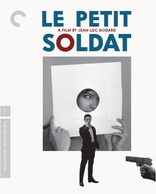Le Petit Soldat Blu-ray Movie
HomeLe Petit Soldat Blu-ray Movie 
The Little SoldierCriterion | 1963 | 88 min | Not rated | Jan 21, 2020
Movie rating
6.9 | / 10 |
Blu-ray rating
| Users | 0.0 | |
| Reviewer | 3.5 | |
| Overall | 3.5 |
Overview
Le Petit Soldat (1963)
A controversial account of a French army deserter caught between rival political factions.
Starring: Michel Subor, Anna Karina, Henri-Jacques Huet, Paul Beauvais, László SzabóDirector: Jean-Luc Godard
| Foreign | 100% |
| Drama | 82% |
| War | 2% |
Specifications
Video
Video codec: MPEG-4 AVC
Video resolution: 1080p
Aspect ratio: 1.36:1
Original aspect ratio: 1.37:1
Audio
French: LPCM Mono (48kHz, 24-bit)
Subtitles
English
Discs
Blu-ray Disc
Single disc (1 BD)
Playback
Region A (locked)
Review
Rating summary
| Movie | 3.0 | |
| Video | 4.5 | |
| Audio | 5.0 | |
| Extras | 3.0 | |
| Overall | 3.5 |
Le Petit Soldat Blu-ray Movie Review
Reviewed by Dr. Svet Atanasov January 18, 2020Jean-Luc Godard's " Le Petit Soldat" (1963) arrives on Blu-ray courtesy of Criterion. The supplemental features on the disc include an archival audio interview with the director; segment from a vintage program with the director; and archival interview with Michel Subor. The release also arrives with an illustrated leaflet featuring an essay by critic Nicholas Elliott and technical credits. In French, with optional English subtitles for the main feature. Region-A "locked".
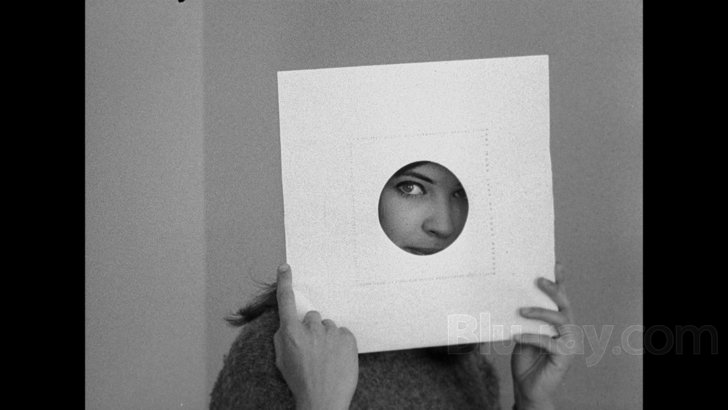
The Russian girl
The reason why people on both sides of the political spectrum disliked this film is actually pretty simple -- its politics are seriously mixed up. Jean-Luc Godard completed it at the height of the Algerian War and there is a decent section of it that is dedicated to the brutal interrogation techniques the FLN boys and the French used on each other. This isn’t exactly a shocking revelation now, but back then some influential people quickly concluded that the film could create public support for the wrong side and a decision was made to ban it. Approximately a year after the war ended, however, the film was unbanned and released theatrically, and much to Godard’s surprise it was immediately bombarded with awful reviews. And they came from the left and right because neither side felt that the film saw the reality of the war from the proper angle. In other words, there was enough gray material in it that basically made it impossible for the two sides to use as a propaganda piece.
As odd as it may sound, both sides were actually right. Here’s why:
If the graphic footage from the second half is removed, it becomes painfully obvious that Godard was very careful not to pick a morally superior side. (By the way, regardless of whether one agrees with the politics of his film, this is precisely what Gillo Pontecorvo did in The Battle of Algiers -- he picked a morally superior side. Of course, in 1966 Pontecorvo had the advantage of knowing how the war ends, but the fact remains that the politics of his film could not have been any clearer). Michel Subor’s assassin is basically an outsider stuck between two groups of bad players that are willing to do all kinds of bad things to him to get what they are after. Does this sound like a ‘realistic’ depiction of the war that had the French split in half? Of course, it does not. It is a classic setup for a conventional gangster film. Then there were the disjointed ramblings of the assassin. As his infatuation with the foreign girl (Anna Karina) blossoms, his mind routinely drifts away and at times it very much looks like he does not actually believe in the purpose of his mission. What a mess, eh? Or was this a big red flag that Godard’s film was actually a condemnation of the war and the politics that the two rivaling sides promoted? Well, in the grand scheme of things it did not matter because the film had its politics badly mixed up and at the end was seen as equally dismissive of the Algerian ‘terrorists’ and the French ‘animals’.
What about the romance between the assassin and the foreign girl? It does not take a genius to realize that it was supposed to be a facade that protects Godard from the ideologues. Beautiful Geneva can almost, almost fool one to believe that the romance is what matters in this film, not its politics, and that Godard was offering another story about unconventional lovers like the ones that Jean-Paul Belmondo and Jean Seberg played in his directorial debut. All these years later the romance is exactly what makes the film attractive because it is where Godard behaves like the playful and creative Godard that forced people to reconsider what cinema ought to be, but there just isn’t enough of it. There is some wonderful footage with Karina acting like a girl who wants to be loved and a few shots of Subor looking like a man who has discovered his muse but it is scattered all over the film, making it impossible for the magic to flourish.
*This upcoming release of Le Petit Soldat is sourced from a recent master that was struck from the original 35mm camera negative in France. It was approved by cinematographer Raoul Coutard.
Le Petit Soldat Blu-ray Movie, Video Quality 
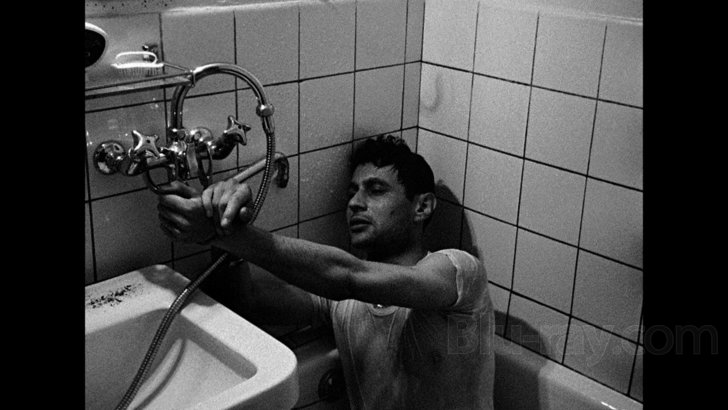
Presented in an aspect ratio of 1.36:1, encoded with MPEG-4 AVC and granted a 1080p transfer, Le Petit Soldat arrives on Blu-ray courtesy of Criterion.
The following text appears inside the leaflet that is provided with this Blu-ray release:
"This high-definition digital transfer, undertaken by StudioCanal and approved by cinematographer Raoul Coutard, was created from the 35mm original camera negative at Digimage Classics/Hiventy in Joinville-le-Pont, France. The original monaural soundtrack was remastered from a 35mm optical soundtrack positive."
The film looks healthy and appropriately vibrant. Depth, clarity, and fluidity remain very pleasing, though you should keep in mind that because the camera always moves occasionally there are some rather abrupt shifts in terms of density. (Typically, these occur during camera movement in outdoor footage). The grading is good, but there are a couple of sequences where contrast levels fluctuate a bit and produce some 'thicker' than usual visuals. However, this isn't a flaw of the presentation, as such appear on many films that Coutard lensed throughout the years. Additionally, there are a few areas where grain stability isn't optimal, but it appears that this is a retained effect from the master. (Example: what appears to be compression inconsistency on the right side of the frame in screencapture #1 is something entirely different). Image stability is outstanding. (Note: This is a Region-A "locked" Blu-ray release. Therefore, you must have a native Region-A or Region-Free player in order to access its content).
Le Petit Soldat Blu-ray Movie, Audio Quality 
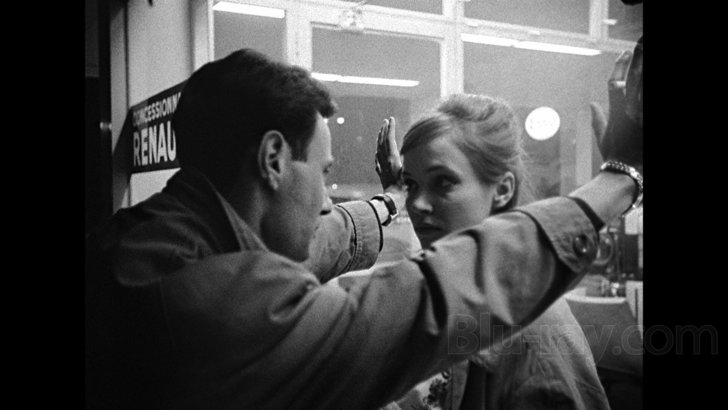
There is only one standard audio tracks on this Blu-ray release: French LPCM 1.0. Optional English subtitles are provided for the main feature.
The dialog and monologue are stable and always very easy to follow. Dynamic intensity is limited, but it is because the original soundtrack does not really offer any material that could impress folks that appreciate what modern mixes have to offer. In other words, the lossless track faithfully recrudesces the native qualities of the original soundtrack.
Le Petit Soldat Blu-ray Movie, Special Features and Extras 
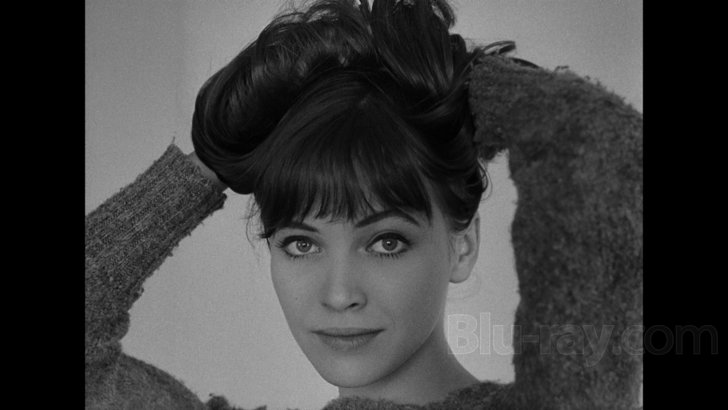
- Jean-Luc Godard - presented here is a segment from an archival interview with Jean-Luc Godard in which the director quickly addresses the negative critical reception of Le Petit Soldat. The interview was conducted in 1965. In French, with optional English subtitles. (7 min, 1080i).
- Michel Subor - in this archival interview, actor Michel Subor discusses his involvement with Le Petit Soldat, and specifically the shooting of the graphic interrogation, as well as Jean-Luc Godard's directing methods. There are also a few interesting comments about the banning of the film. The interview was conducted in 1963. In French, with optional English subtitles. (14 min, 1080i).
- Gideon Bachmann and Jean-Luc Godard - in this archival audio interview, Jean-Luc Godard discusses his career as a critic and filmmaker, the production of Le Petit Soldat and the then-current trends in French cinema. The interview was conducted by critic Gideon Bachmann in 1961. In English, not subtitled. (30 min, 1080p).
- Leaflet - an illustrated leaflet featuring critic/writer Nicholas Elliott's essay "The Awful Truth" and technical credits.
Le Petit Soldat Blu-ray Movie, Overall Score and Recommendation 

Is Le Petit Soldat a political film or not? Michel Subor tells us that it is not, but it has been seen and critiqued as such since its release in the early '60s. Well, half the problem with Le Petit Soldat is right there -- if it was not conceived to be a political film but virtually everyone focuses on its politics then something did not work as intended. The other half of the problem is that as a political eye-opener it remains extremely cautious, which is exactly why back in the days it was dismissed by left and right-leaning critics. (Ironically, but not surprisingly, the politics of the film is precisely what contemporary critics focus on, only this time their take on it is completely different). The romantic material is where Jean-Luc Godard becomes the playful and creative director that forced people to reconsider what cinema ought to be, but there just isn't enough of it. So, the only thing that the wonderful footage with Anna Karina and Subor accomplishes is make it rather obvious that without the politics Le Petit Soldat could have been as impressive as the film that preceded it, Breathless. RECOMMENDED, but only to Godard completists.
Similar titles
Similar titles you might also like

The Image Book
Le livre d'image
2018

The Battle of Algiers
La battaglia di Algeri
1966

A Hidden Life
2019

Secret Sunshine
밀양 / Milyang
2007

The Club
El Club
2015

Omar
2013

La Chinoise
1967

Kagemusha
影武者
1980

No
2012

La Grande Illusion
Grand Illusion
1937

Wooden Crosses
Les croix de bois
1932

The Passion of Anna
En passion
1969

Hiroshima mon amour
1959

Of Gods and Men
Des hommes et des dieux
2010

Cemetery of Splendor
2015

I Am Cuba 4K
Soy Cuba
1964

Muriel, or the Time of Return
Muriel ou le temps d'un retour
1963

Zama
2017

Out 1
Out 1, noli me tangere
1971

Tout Va Bien
1972
